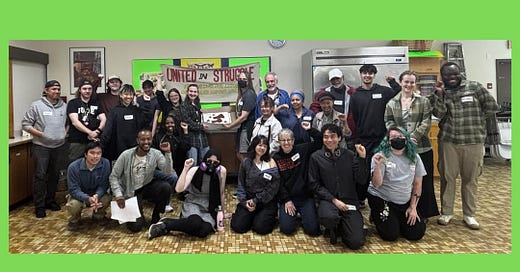One Year of Struggle and Solidarity: SVNA Marks Its First Anniversary
The South Vancouver Neighbourhood Assembly marks one year of grassroots organizing, class struggle and building power from below
As published by The Wheel
On Saturday, June 14, community members gathered in Marpole to celebrate a milestone: the one-year anniversary of the South Vancouver Neighbourhood Assembly (SVNA). What started in June 2024 as a response to deepening economic injustice in South Vancouver has, one year on, grown into a force that continues to organize, educate, and mobilize residents toward a clear and urgent goal—building working-class power in the neighbourhood.
The event, held in a familiar community on Hudson Street, was part reflection, part planning session, and part celebration. It began with a series of short, powerful presentations from organizers who gave an overview of SVNA’s evolution over the past year and a clear-eyed look at the road ahead. The message throughout was consistent: the SVNA exists to serve the working class in South Vancouver—and to struggle against those who profit from our suffering.
A Clear Vision Rooted in Class Power
At the core of the presentations was a clear recognition: the housing crisis, skyrocketing food prices, and overstretched public services are not isolated problems—they are interconnected consequences of capitalism. And they demand a political response grounded not in charity or reform, but in working-class unity and struggle.
“We live in this neighbourhood—why should we not decide what happens in it?” one speaker declared to nods and applause. It's this conviction that continues to guide SVNA’s work: that power must shift away from landlords, developers, and monopoly capitalists—and toward the people who actually live and work here.
Many of the examples shared by presenters began with phrases like “while we were out in the community speaking to our neighbours” or “one tenant we spoke to told us,” reflecting SVNA’s commitment to organizing through direct engagement. These stories painted a vivid picture: tenants commiserating about broken elevators left unfixed for weeks, landlords who claim they’re “waiting on a part” while still raising rents, and other common issues such as landlord harassment, eviction threats, and sudden, unaffordable building changes imposed without input.
…these stories weren’t just shared as complaints—they were rallying points, grounding the Assembly’s analysis in the real, lived experiences of its members and neighbours.
Companies like InterRent and Onni Group were named as corporate landlords extracting wealth from the community while making living in the area increasingly unaffordable. But these stories weren’t just shared as complaints—they were rallying points, grounding the Assembly’s analysis in the real, lived experiences of its members and neighbours.
Membership Voices and Community Direction
This wasn’t just a meeting to mark time—it was an opportunity to evaluate direction based on member feedback and grassroots engagement. The room broke into smaller groups where neighbours shared stories, connected struggles, and imagined collective solutions.
Conversations ranged from the personal to the political: tenants talking about eviction threats, sudden building changes without notice, or the grinding anxiety of looming rent increases.
One particularly moving story came from a senior member who described spending three months climbing the stairs to her third-floor apartment after the building’s elevator broke down. With a painful knee, she explained how she had to hobble up slowly each day but refused to give up. She kept speaking out, calling the landlord, and demanding action—refusing to be ignored. Her persistence paid off: eventually, the owner forced the building manager to carry out the necessary repairs. Her story was a powerful reminder that when we don’t back down, we can force change, even in the face of indifference.
Together, attendees built on a shared understanding that individual hardship is rooted in collective oppression—and that building power begins with connection and organization.
In these breakout circles, a simple phrase captured the room’s energy:
“From connectivity to collectivity.”
The SVNA puts forward clear, uncompromising demands that reflect the needs of the working class:
No rent increases
No evictions
No building changes without tenant consent
These demands reflect not just resistance, but an assertion of dignity and agency. They are expressions of working-class democracy in action—a vision of a neighbourhood where tenants and workers, not developers and capitalists, determine how they live.
A Movement with a Future
As the formal part of the afternoon wrapped up, attendees shared slices of birthday cake—small but meaningful, a sweet marker of a year’s worth of tireless organizing and collective effort. One member summed up the moment simply:
“They ignore us until we show up together.”
The SVNA is not simply a tenant group, a political club, or a protest outfit. It is a growing democratic space, rooted in class consciousness and powered by the determination to identify the enemy, confront division, and fight to win. The past year has shown what is possible when neighbours come together; not just to share grievances, but to organize for real power.
The goal is not just to listen—but to act.
As the organization enters its second year, the work deepens. SVNA is actively conducting a community-wide survey to reach more residents, better understand the specific struggles facing people in the neighbourhood and sharpen its collective strategy. The goal is not just to listen—but to act. At the anniversary meeting, SVNA also unveiled its new logo and officially launched its membership program, complete with sharp, custom-designed membership cards—a small but powerful symbol of belonging and commitment to the struggle ahead.
For those ready to get involved, the next general meeting will be held on July 12, marked by a community barbecue open to all. It will be a chance to meet neighbours, learn more, and take the next step in building working-class power together. In a city increasingly shaped by speculation, privatization, and profit, the SVNA stands as a bold and radical force: a neighbourhood assembly where working-class people are finding each other, building unity, and daring to imagine—and fight for—a better future.




